Listen while you read! I’ve curated a Spotify playlist to go with this article, featuring the artists mentioned and various other Black musicians.
If I were to ask you to name the original rock n’ roll artist, who would you think of?
Elvis, the King of Rock, who built his career on “borrowing” songs from Black folk? Maybe you’d say The Beatles. Chuck Berry, perhaps? The truth is, you really can’t credit any one artist with pioneering the genre. You can, however, take a look back at its origins and give what credit’s due to the artists who revolutionized the scene and ushered in an era of music that would change everything.
In this article, we’re going to take a look at a few of those trailblazers and the origin of the name “rock n’ roll” itself.
Sister Rosetta Tharpe
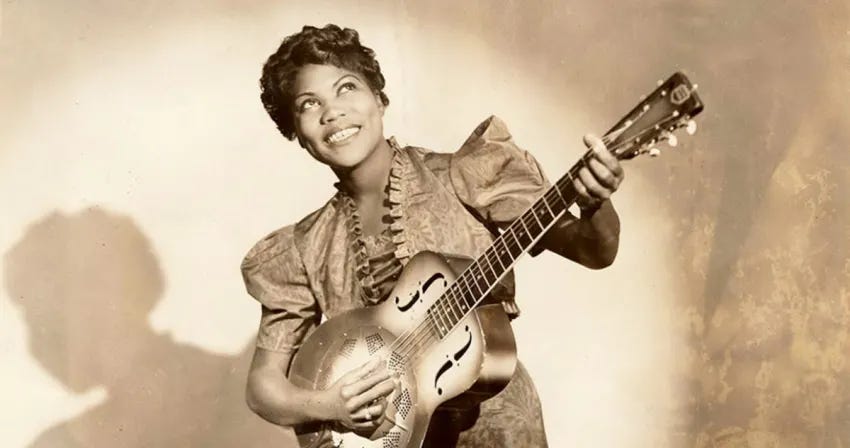
Let’s start by talking about Sister Rosetta Tharpe.
The aforementioned Chuck Berry once said his entire career was “one long Sister Rosetta Tharpe impersonation.”
Tharpe, born Rosetta Nubin in Arkansas into a family of religious singers, had music in her soul since day one. She grew up performing various gospel and evangelical tunes with her mother and other close relatives, and that gospel music eventually shifted into a more classic blues style as she got older.
Tharpe’s unconventional blend of gospel and blues was ahead of its time in the 1930s. It can be easily argued that she would’ve made a bigger name for herself earlier on if racism wasn't more rampant than swingin’ tunes in the early 20th century. Mixing gospel style with secular themes was also generally frowned upon, and Tharpe was a woman, so the odds were stacked against her.
Her resilience and unabashed individuality led her to join the Cotton Club Revue, Black performers at a whites-only nightclub in Harlem, in 1938. That same year, she signed with Decca Records, recording iconic rock tracks including “This Train and “Rock Me.”
“Rock Me,” in particular, served as a notable precursor for much rock music we hear today. Tharpe’s stylized singing voice, complete with belts and growls, combined with her passionate, intricate guitar playing would inspire the next generation of musicians.
Tharpe was a true pioneer of the genre. She was inducted into the Rock and Roll Hall of Fame in 2018. She contributed so much to rock n’ roll. Yet, when she died in 1973, she was buried without a headstone and few spoke about her death. Today, half a century later, I think it’s more important than ever to recognize influential people like Tharpe and thank them for what they did for music and culture in general.
Bo Diddley
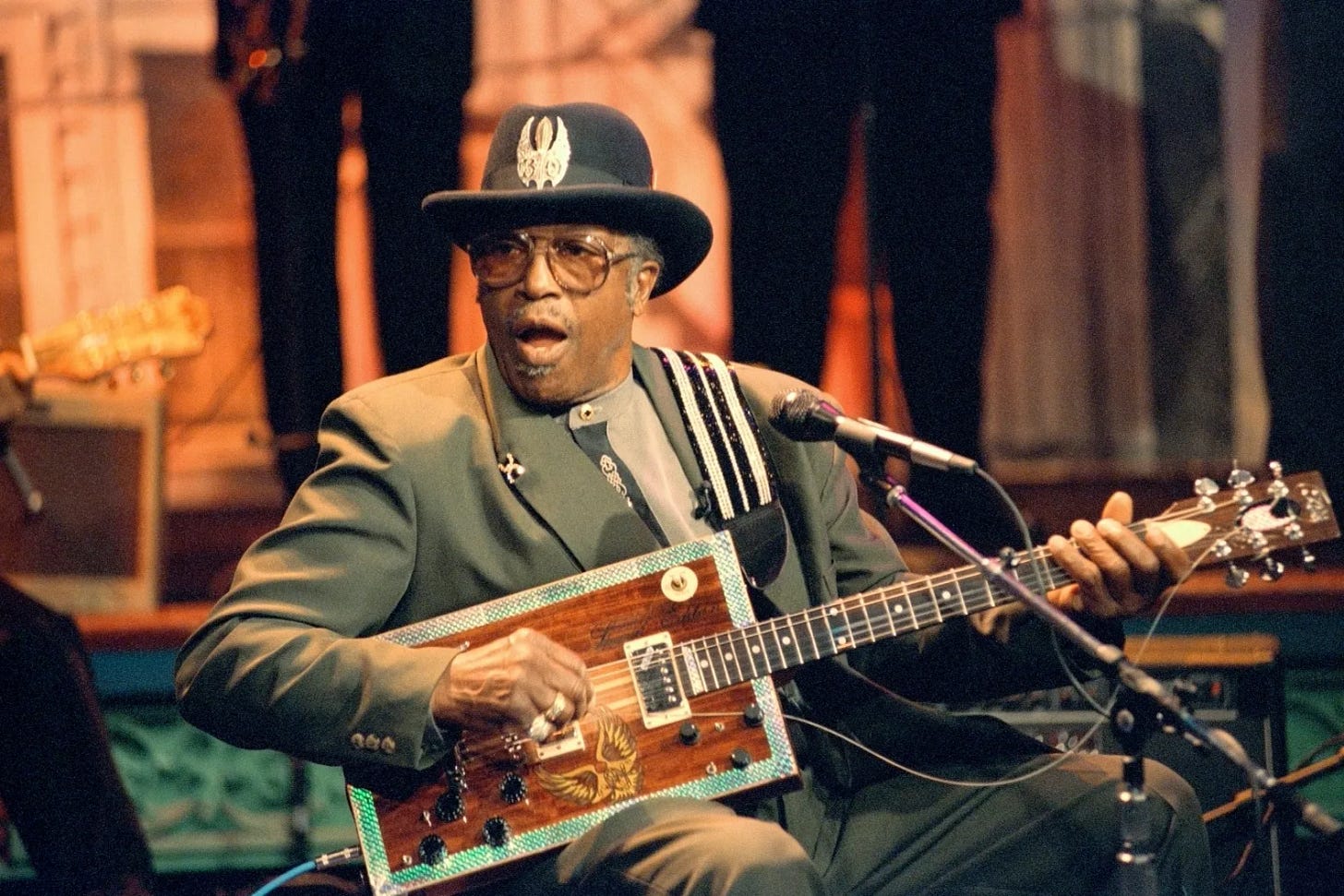
While Tharpe utilized both gospel and blues in her tracks, I’d be remiss if I didn’t talk about Bo Diddley’s infamous blues sound.
Diddley, whose career spanned from the late 40s and all the way into the early 2000s, is generally credited for putting the “rock” in rock n’ roll. Born Ellas Otha Bates in Mississippi in 1928, Diddley grew up loving trombone and violin and would go on to learn guitar in 1940. Like Tharpe, he was also heavily inspired by the gospel songs sung in his Pentecostal church, which would influence him down the line.
Diddley was anything but average. In fact, his eccentricity—from his bold stage presence to his wacky guitars and outfits—is, in many ways, what made him so notable.
Diddley started off playing with local bands, eventually releasing his first single, the eponymous “Bo Diddley,” in 1955. The track topped the charts for 18 weeks and, allegedly, was the first of its kind in blending traditional African-American beats (“hambone”) with blues rythyms.
“Hamboning,” also known as the “Juba Dance,” traces its origins back to West Africa and made its way into America when slaves would do it on plantations. The beat was originally done using drums but, having little to work with, slaves would use their hands instead, which became a technique musicians everywhere would use after Bo Diddley revolutionized it and morphed it into the “Bo Diddley beat.”
You’ve definitely heard it before.
Some popular songs that utilized Diddley’s beat include Elvis’s “His Latest Flame,” Bow Wow Wow’s “I Want Candy,” and “Faith” by George Michael.
Diddley had a very successful, decades-long career, but he never shied away from talking about income disparity and unfair treatment of Black musicians in the industry.
Diddley was inducted into the Rock and Roll Hall of Fame in 1987 and received a Grammy Lifetime Achievement Award in 1998. He passed away in 2008 and his career was active until his final days.
Chuck Berry
Chuck Berry is hardly anything less than a household name, but I think it’s worth learning more than what we might already know about the “Johnny B. Goode” singer if we truly want to appreciate Black artists’ early contributions to the rock genre. I don’t think you can credit the genre to one artist, but it’s not a stretch to call him the Father of Rock n’ Roll.
Born Charles Edward Anderson Berry on October 18, 1926, in St. Louis, Missouri to the grandchildren of enslaved people (his mother was one of the first Black American women to earn a college degree), Berry was interested in music from a very young age.
Berry attended the Sumner High School, a private school that was the first all-Black high school west of the Mississippi. For an annual talent show, he sang a rendition of Jay McShann's "Confessin' the Blues" while his friend played the guitar part and Berry loved the experience so much that he decided to learn guitar himself, taking lessons from jazz superstar Ida Harris.
Berry didn't finish high school. After dropping out at 17, he and some of his friends were arrested for a string of robberies. He was sentenced to 10 years behind bars but was let go after three for good behavior. He’d face more criminal charges later on in his life—some involving tax evasion, harassment, and transporting a minor across state lines for “immoral purposes,” permanently staining his still-iconic legacy.
In 1955, Berry released his single “Maybelline,” which is known by many as the true original rock song. The track had hints of blues and country and hit the top of the charts.
Berry went on to release a number of hits that were popular with both Black and white audiences, such as “Johnny B. Goode,” “Reelin’ and Rockin,’” and “Run Rudolph Run.” It can be argued that Berry’s generic lyrics and generally tame subject matters allowed his songs to top the charts as frequently as they did.
Berry once said he “made records for people who would buy them—no color, no ethnic, no political.”
Regardless of what intentions with his releases were, it’s undeniable the impact he had on the genre and on Black musicians. A copy of “Johnny B. Goode” was placed on the Voyager 1 space probe so that whoever (or whatever?) finds it sometime in the future can listen to what’s arguably one of the most iconic rock n’ roll tracks of all time and get a feel for the genre.
Berry was inducted into the Rock and Roll Hall of Fame in 1986, just one year before Diddley. Like Diddley, he also won a Grammy for Lifetime Achievement in 1984. He died in 2017 at the age of 90.
Trixie Smith, Allen Freed, and Cleveland, Ohio
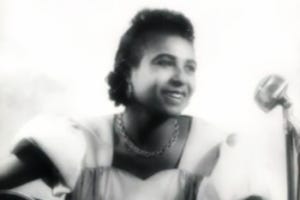
The phrase “rock and roll” itself actually predates the artists highlighted in this article. It can be traced back to Trixie Smith, a Black blues singer and actress, when she released “My Baby Rocks Me with One Steady Roll” in 1922.
Smith, born in Atlanta, Georgia in 1900, got her start performing in the vaudeville circuit, and eventually added legendary trumpeter Louis Armstrong as one of her background performers. She’d go on to perform as the frontwoman of jazz bands and starred in a number of films. She passed away in 1943.
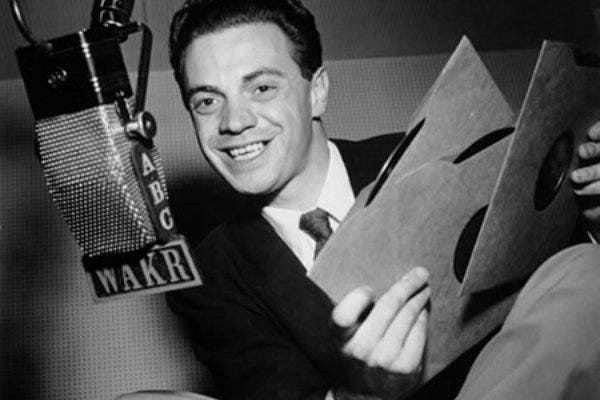
“Rock and roll” didn't become the accepted name for the genre until much later in 1951, when Cleveland-based disc jockey Allen Freed started using the term on his blues radio show “Moondog’s Rock and Roll Party.” Freed, a white man, opted to play the original Black recordings of songs as opposed to white covers. His station exposed white listeners to tunes they wouldn’t have heard without it, and he acted as the megaphone that sent rock n’ roll into mainstream popularity.
Freed would move to New York in 1954, where he’d feature various rock artists on his show, including Bo Diddley and Chuck Berry. He was inducted into the Rock and Roll Hall of Fame in 1988 and died in 1965.
Because of Freed’s contributions to rock, Cleveland, Ohio (and Memphis, Tennessee, depending on who you ask) became known as the birthplace of rock n’ roll (though, as you know from reading this article, its actual origins span much farther out). The Rock and Roll Hall of Fame was placed in Cleveland to commemorate it.
Keep rockin’ and rollin’
There are, of course, countless other Black rockers who contributed to the early days of the genre, and countless others continue to do so today. I couldn’t possibly fit them all into one Substack article. So, instead of listing them off, I’m asking you to use that wonderful device you’re reading this on to find some other names I didn’t mention and listen to some tunes you might not’ve heard until now.
This Black History Month—and every month—I want to encourage you to be curious. Look into the origins of some of your favorite things. The next time you listen to a rock song, remember where that genre originated.
As our government actively tries to erase our nation’s history, now is more of an important time than ever to recognize Black accomplishments, struggles, and history and take every opportunity we get to educate ourselves. Rock on.
Sources
https://www.npr.org/2017/08/24/544226085/forebears-sister-rosetta-tharpe-the-godmother-of-rock-n-roll
https://producelikeapro.com/blog/artists-who-changed-music-sister-rosetta-tharpe/
https://www.jambase.com/article/sister-rosetta-tharpe-godmother-rock-n-roll-playlist
https://www.britannica.com/biography/Bo-Diddley
https://dos.fl.gov/cultural/programs/florida-artists-hall-of-fame/bo-diddley/
https://www.rollingstone.com/music/music-news/bo-diddley-guitar-god-40403/
https://www.udiscovermusic.com/stories/bo-diddley-beat-feature/
https://www.biography.com/musicians/chuck-berry
https://www.britannica.com/biography/Chuck-Berry
https://www.remindmagazine.com/article/20538/chuck-berry-arrested-prison-history/
https://aaregistry.org/story/trixie-smith-singer-born/
https://www.kunc.org/music/2013-11-09/trixie-smith-helped-give-us-the-term-rock-and-roll
https://case.edu/ech/articles/f/freed-alan
https://www.radiohalloffame.com/alan-freed






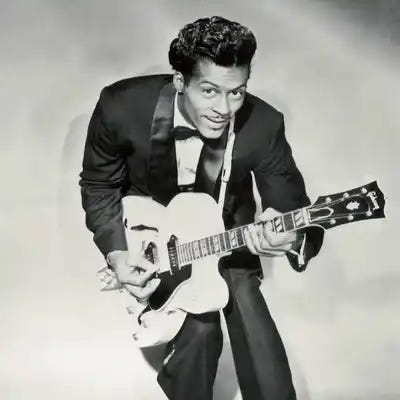
Great article. Even though I knew the importance of black people to rock, never knew their faces, it was awesome to learn more about my favorite music genre. Keep the great work.